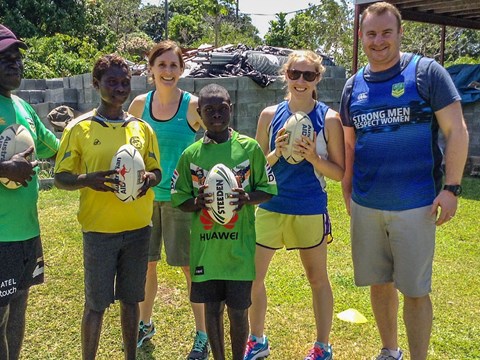
The NRL-run League Bilong Laif (League for Life) program in Papua New Guinea is positively changing the lives of participants, according to an evaluation by the Centre for Sport and Social Impact at La Trobe University.
Experts from La Trobe recently returned from a visit to PNG to assess the impact of League Bilong Laif, a sport-for-development program that runs in schools and promotes messages about respect and the importance of education for all Papua New Guineans. The program is funded by the Australian government and delivered by a team of Papua New Guinean NRL staff in four regions.
"We are starting to see that League Bilong Laif is more than just a schools program and can impact change for females, males and people with disabilities of all ages and in all regions" says NRL Pacific Program Manager John Wilson, who travelled with the La Trobe review team to Port Moresby, Eastern Highlands Province, East New Britain Province, and the Autonomous Region of Bougainville.
"The NRL PNG team under the management of Mark Mom are doing a great job. We are building awareness that rugby league is not just a sport through delivering our positive education and respect messages in each community that will ultimately define the future of the program. The team is also delivering the program in sign language to make it more accessible" said Mr Wilson.
In addition, research found that participating in the League Bilong Laif program provides children with an opportunity to engage with education in a meaningful way, and that the program reinforces the message of gender equality through female NRL PNG staff, who are seen as role models and strong women.
Reflecting on his visit, Mr Wilson said PNG was full of great people that were looking for ways to contribute to their communities for a better tomorrow. "League Bilong Laif is a great platform for our staff to give back. In each region that we visited, the staff presented new opportunities for me to explore the cultural and logistical differences that affect the programs we deliver every day," he said.
The research has found that the impact of the program extends beyond participating children, with preliminary findings suggesting positive change for program staff and broader communities, through partnerships with PNG and international charities, and community outreach programs.

Education specialists have been involved from the initial stages to establish and review the LBL program to ensure quality delivery of the program with desired outcomes. Review team member and sports management specialist Dr. Emma Sherry said they monitor education and gender equality outcomes through surveys and interviews with teachers and NRL PNG staff, stories of change with children, and via in-depth in-country interviews with program funders and key stakeholders. By utilising these tools, the review team has sought to identify changes in attitude, behaviour and the impact of these on the participants, their school and community.
Dr. Sherry stated that the LBL program had grown exponentially since its inception three years ago, and the success of employing full-time staff, reaching out to dozens of schools, hundreds of teachers and many thousands of children is a testament to the dedication and expertise of the staff in both PNG and Australia.
"During the pilot phase, the program had been refined and is now being replicated across the Pacific [Fiji, Samoa and Tonga] as an example of how to actively engage children and their communities in education" she said.
League Bilong Laif is managed through a three-way partnership between the Australian Government, the PNG Government (represented by the National Department of Education) and the NRL. The program is supported by the Autonomous Bougainville Government Department of Education, the PNG Rugby Football League (PNGRFL), the University of PNG and the PNG National Sports Institute.